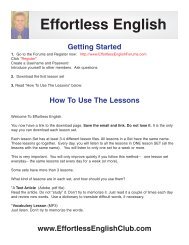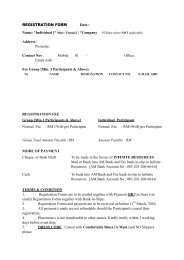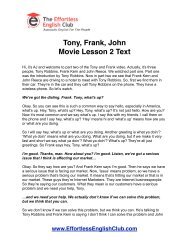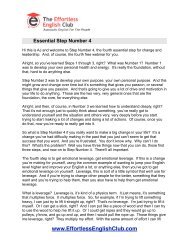Hidden Curriculum VIP - Audio - Effortless English
Hidden Curriculum VIP - Audio - Effortless English
Hidden Curriculum VIP - Audio - Effortless English
Create successful ePaper yourself
Turn your PDF publications into a flip-book with our unique Google optimized e-Paper software.
www.<strong>Effortless</strong><strong>English</strong>Club.com
<strong>Hidden</strong> <strong>Curriculum</strong> <strong>VIP</strong> - <strong>Audio</strong>Hello my special <strong>VIP</strong>, welcome to this month’s lesson. Now this month’s topic is a topicthat I am very, very passionate about. Yes, I know. I’m usually passionate about thetopics, but this one especially, because this one is connected to my purpose in life.This one is connected to my mission with <strong>Effortless</strong> <strong>English</strong>. It’s a topic that makes meexcited and passionate on the one hand in a positive way, but which also really makesme angry when I think about the negative parts of it.Now the title this month is the ‘<strong>Hidden</strong> <strong>Curriculum</strong>’, <strong>Hidden</strong> <strong>Curriculum</strong>. Now, of course,a curriculum is the topics that you study in a class or school. So it’s kind of the course ofstudy. It’s the list or the plan of study and, you see, in schools there are two curriculums,in all schools. I’m taking about from kindergarten all the way through graduate schooland the Ph.D. level.There are two curriculums in all schools. The first is the stated curriculum. “Stated”means what they actually say directly. Now the stated curriculum would be things likeMath, Science, History, Language, Physical Education, right? That’s the statedcurriculum. It’s what you will find in all the paperwork. It’s kind of the normal plan formost schools in most countries. So what is the hidden curriculum?Well, the hidden curriculum is just as common in almost all countries in the world, justas powerful and, yet, they don’t talk about it and the hidden curriculum, unfortunately, isvery negative. What is the hidden curriculum? What are the kinds of hidden thingsyou’re learning in school from when you were a very small child until you were all theway through high school, university, for some of you, graduate school?There were certain messages that they were teaching you, but they didn’t tell youdirectly. Maybe you’ve never thought about the hidden curriculum; yet, this hiddencurriculum, which in my view is very negative, is probably the thing that is causing a lotof problems in your life, probably the thing that has limited your success in your life thathas stopped you from getting everything that you want.What is the hidden curriculum? What are the messages that we get in school from ayoung age all the way through ‘til we’re finished that really cause us problems in reallife. Let me read a few, because I’ve written some down.One of them, one of the messages you get in school constantly is do as you are told. Doas you’re told. Obey. Yes? As a kindergarten child, a little small child, it’s one of themessages you got from your teachers in school. Do what the teacher tells you to do.Obey the teacher. If you didn’t, you got punished in some way. If you did, you got nicewww.<strong>Effortless</strong><strong>English</strong>Club.com
little rewards and compliments and things like that. You learned at a very young age todo what you were told by other people.Now related to this is another message in the hidden curriculum of schools and that istrust the experts. Trust the experts, right? You learn this as a student. Trust the teacher.The teacher knows better than you. Trust the teacher. If the teacher says something istrue then you should accept it and when it’s time to take a test, you should put down theteacher’s answer and don’t think too much about it and don’t try to check the teacher’sinformation, right? Just trust the expert. Just trust the teacher.Another thing you got in schools is that there’s one right answer to most problems orquestions, right? Most schools now and for many years really love these multiple-choicekinds of tests – A, B, C and D – and there’s only one right answer and it has to be oneof those four. So something else you learned was that there were limited choices andthat there’s only one right answer. And who decides the right answer? The teacher; theexpert.Another message you got was don’t make mistakes. It’s part of the hidden curriculum.Don’t make mistakes. Mistakes are bad, right? In school when you make a mistake youget an X. You get the red pen. You get the lower grades. Mistakes are punished inschool, generally. So you learn mistakes are bad. Don’t make mistakes. Try to avoidmistakes. You learn to please the teacher; try to make the teacher happy. That’s part ofthat same message of trust the expert and do what you’re told.And you learn to sit and be quiet; that the process of learning happens when you sit andyou’re quiet. You sit quietly, you don’t move very much and you passively listen to theexpert. You accept everything they say and then later you’re tested on it and that’s thefinal one. Learning equals tests and grades, right? You learn that learning means tests.If you don’t take a test then you’re not really learning. That’s part of the hiddencurriculum of most schools.Now, I have a big problem with all of these messages, because they’re all wrong andthey will all hurt your success in life, because you are the expert in your own life notsomebody else. In fact, I kind of learned this at a young age. In high school, I learnedthat my teachers they lied to me sometimes or they were ignorant. They would tell mesomething was true, but then I would read about that topic in more detail, because I wasinterested in it, and I would find that people who actually knew more about that topicdisagreed with my teachers.This was true in History, in Science, in lots of different areas and I realized whoa, wait asecond. My teacher is teaching me stuff, but it’s not necessarily true. And I was a bit of abad student and I argued with my teachers, sometimes. They didn’t like that very much,but it was a good lesson to learn that hey, the expert is not always right. I need to trustwww.<strong>Effortless</strong><strong>English</strong>Club.com
myself. I need to find information myself, not just passively accept what the expert istelling me. Important lesson and, hopefully, you’ve learned that and if you haven’tlearned that lesson yet, it’s time to learn it now.I’m going to read a quote from Robert Kiyosaki. It says “By unlearning the self-defeatinghidden curriculum, which has thus far limited you, you can begin to experience thesuccess that you know deep down inside can be yours. Your new success can thenbecome a beacon to inspire others.” Now a “beacon” is a light. It’s a strong light.So what he’s saying is that you have to unlearn all of these messages in school,because those messages stop you from being successful. In fact, you want to do theopposite of all of those things in order to be successful in real life, not school and thenwhen you become successful, hopefully, you will inspire other people to also becomesuccessful.That’s part of what I hope to do. I have become successful in my own life in manydifferent ways, now I’m hoping to help you also become more successful; to have thelife you want. You gotta’ unlearn all of these things. Let’s talk about a few of these.Number one, don’t make mistakes. Mistakes are bad. Oh, that one makes me angry.Look, mistakes are the secret to learning. Mistakes are the secret to success. If you arenot making mistakes it means you’re not taking risks. If you’re not making mistakes itmeans you’re not trying things that are new enough or difficult enough. You’re notchallenging yourself if you’re not making mistakes and that means you’re not growing ifyou’re not making mistakes. You gotta’ make a lot of mistakes, that’s how you learn.When I started <strong>Effortless</strong> <strong>English</strong>, I didn’t know anything about business or technologyand I made lots of mistakes. I’m still making mistakes with the business, but I learn fromthem. That’s how I have learned so much in a very short period of time and that’s whyI’m successful now, today.I’m grateful for my mistakes. If I had tried to be safe all the time and correct all the timeI’d still be poor. I wouldn’t be enjoying my teaching this much. My life would not be asgood as it is now. So that’s number one. You gotta’ learn to love mistakes, to acceptthem, to laugh at them and, of course, always learn from them.Another one, the, do as you’re told; trust the experts. I have now learned to, basically,do the opposite. I never trust experts. When I hear an expert, especially a normal expertlike on TV, somebody that everybody thinks is correct, I automatically distrust them. I’mautomatically suspicious; because I’ve learned over the years in my life that what mostpeople think is correct is very often wrong and not correct.www.<strong>Effortless</strong><strong>English</strong>Club.com
When it comes to money, for example, a few years ago, when our economy in the worldseemed to be doing really well, all the experts on TV were talking about the greateconomy. Everything is wonderful! It’s great! Invest your money in your stock marketnow! Yeah! Thankfully, luckily, I didn’t believe them. Instead, I did my own research and Ilearned a lot.I didn’t know anything about money or investing before, but I learned a lot and I foundother people who were not just experts, but who were very successful, who were doingvery well. I found that a lot of these people were saying no, no, no, the economy is notgood in the world. It’s going to crash, be careful and, luckily, because I learned myself, Ididn’t trust the TV experts -- the big experts -- luckily, I didn’t lose a lot of money. LuckilyI was prepared when the world economy started to crash.It’s not just economics it’s everything. Just like in learning <strong>English</strong>, right? What have theexperts told you most of your life, your teachers, your textbooks? They’ve told you thatgrammar is the key. Studying grammar rules, memorizing lots and lots and lots and lotsof grammar rules and what else? Memorizing a lot of vocabulary lists.That’s what they told you, was the key. That’s what they tested you on; mostly, thosetwo things, but after many years you discovered and realized that those experts – thoseexperts – were wrong. You know they’re wrong, because you weren’t speaking <strong>English</strong>well after taking those classes; after taking those courses.Luckily, you got on the Internet and you started looking for different answers. Youeducated yourself to find out more information. That’s the secret to success. That’s whynow you’re having more success with your <strong>English</strong> speaking and you will continue tohave more success. You just didn’t trust the experts, what everybody always told you,you went looking for more information, very, very important.Another part of the hidden curriculum in schools that I really dislike and that I thinkcauses a lot of pain, causes pain for children in school, it causes pain for us most of ourlives and it causes us to fail a lot, that belief, that message that they teach us is this.Helping other people equals cheating, right?In school if you’re taking a test and someone next to you is having trouble, they don’tknow the answer, they’re not sure, if you tell them the answer, if you try to teach them, ifyou try to help them, you will become a cheater, right? The teacher will get very angryand they’ll punish you, they’ll punish the other kid and you learn that helping otherpeople is cheating.Another message you get is that learning is a competition; that some people succeedand other people must fail. It’s a lie. It’s a lie. Learning is not a competition. It’ssomething we all do together. There are no stupid people, in my opinion. There are notwww.<strong>Effortless</strong><strong>English</strong>Club.com
stupid people. There are confused people. There are people who don’t understandsomething. There are people who learn in a different way, but they can all learn. Theycan all be taught.This idea of competition in learning, it really bothers me and it’s a lie, because in thereal world, in business, for example, you have to help other people and you need otherpeople to help you. There’s no way to do it alone.With my business I’ve had so many people helping me. I don’t know enough aboutcomputers. I need computer experts, computer technicians, computer programmers, tocreate my websites and do the programming. I must have their help. I’m not a greatartist, so I need graphic artists to design my websites. I need photographers to takegood pictures. I need accountants to manage my money and to manage the businessfinancial part.I can’t do all of this by myself. No way. I need them to teach me. I need them to helpme. Likewise, I help other people. I help my friends. I help my family to start businessesor to do other things. We gotta’ help each other. That’s how we really learn. We learnfrom other people. We learn from getting help and when we help other people we alsolearn something. It’s not cheating.This idea of competition is bullshit, complete bullshit when it comes to learning.Competition is fun in sports, its fun in other things, but in learning its bullshit. I hate it.It’s wrong. You need to get this idea out of your mind.In fact, I want you to ask yourself this. Be honest. Do you view <strong>English</strong> learning as acompetition? Are you always comparing yourself to other <strong>English</strong> learners? Do you feela little jealous or upset when you meet somebody whose <strong>English</strong> speaking is muchbetter than yours or do you feel superior when you meet someone whose speaking isless powerful, less effective than yours?I’m not judging you. We all have this, because we’ve been taught this, but I just wantyou to think about that and to think about why. Why do you compare yourself to otherpeople? Because you’ve been taught that it’s a competition, but it’s not true. Everybodycan succeed, clearly.If you get better in <strong>English</strong>, it doesn’t hurt anybody else. It doesn’t cause anyone else toget worse and if someone else improves their <strong>English</strong> at the same time it’s great.Everybody gains. It’s wonderful. That’s what we want to do here at the <strong>VIP</strong> site. We allwant to get better together. We’re not competing with each other.Most of you are better language learners than I am. I try to be a great teacher, but as alanguage learner, ah, I’m not so good. I’m a little lazy about it, to be honest, but that’swww.<strong>Effortless</strong><strong>English</strong>Club.com
okay. I’m happy that you’re a better language learner than I am. I love teaching you. I tryto be the best possible <strong>English</strong> teacher that I can be and I’m happy for your success.When I meet other teachers, <strong>English</strong> teachers who are good, I’m happy. I try to learnfrom them. I ask them questions. I try to learn some techniques from them and I’mhappy to teach them what I know also.So, this month, I want you to think about these messages that you learned from a veryyoung age and to think how they might be stopping you from having total success inyour life. Imagine if you didn’t fear mistakes anymore. Imagine if you didn’t try tocompete with people all the time. Imagine if you didn’t trust the experts, but you wentout and you learned yourself. Imagine if you did just what you wanted to do and youdidn’t worry about pleasing everybody else. Imagine how much more powerful andeffective and successful you would be with those new beliefs.Finally, what I want you to do is this. You’re a <strong>VIP</strong> and as a <strong>VIP</strong> we’re all leaders. Youdon’t need to be perfect. What I want you to do, though, is to, of course, improve yourown success. Improve your <strong>English</strong> speaking confidence. Improve all parts of successin your life, but don’t stop there.We’re all teachers, not just me. Teach other people. Help other people. We’re notcompeting. If you know other people who are learning <strong>English</strong>, help them. Teach themthe new ideas and the new methods that you’re learning. Teach it to them. Encouragethem.If you’re good at business, well, help other people who might want to start a business.Encourage them to do it. If you’re good physically, you love working out and you’re greatat health and fitness, well, encourage and help other people in your life to get healthier,fit and to have more energy in their life.This is what living a wonderful life is about. It’s not just your own personal success. It’sgetting rid of this hidden curriculum and adopting a very powerful new belief, which isthis. Mistakes are fine. I’m the expert in my own life and I enjoy succeeding and sharingthat success with other people. I enjoy learning and I enjoy helping other people learntoo. That is what we do here as <strong>VIP</strong>s. That’s the kind of people we are. Those are thebeliefs we have.I’ll talk a little more about this in the audio commentary. I hope you’ll share this visionwith me. Get rid of that hidden curriculum and let’s start this new <strong>VIP</strong> <strong>Effortless</strong> <strong>English</strong>curriculum.All right, have a great day and a great month. See you again soon, bye-bye.www.<strong>Effortless</strong><strong>English</strong>Club.com
<strong>Hidden</strong> <strong>Curriculum</strong> <strong>VIP</strong> – Mini StoryHello this is A.J. Welcome to the mini story for this month. Let’s get started.* * * * *Okay, there was a woman named Carol.What was her name?Carol.What was she?A woman. She was a woman named Carol.Now, she had always been a certain kind of girl.What kind of girl had Carol always been in the past?A good girl. Carol had always been a good girl, most of her life. In the past, she hadalways been a good girl.Had she been a bad girl?No, she hadn’t been a bad girl.Had she been an adventurous girl?No, she had not been an adventurous girl.What kind of girl had she been?A good girl.For example, in school she always got straight As. When she was younger inschool she always got straight A’s and, of course, “straight A’s” means all A’s.Her grades for all classes, they were always A’s, A’s, A’s, A’s. No Bs. No Cs. NoDs. No Fs. She got nothing but A’s, straight A’s.So what were her grades like in school?Straight A’s. She got straight A’s.www.<strong>Effortless</strong><strong>English</strong>Club.com
Did she bet any B’s when she was in school, when she was younger?Never. She never got any B’s. She always got straight A’s from when she was verysmall as a kindergarten student through elementary school through middle schoolthrough high school through university.What kind of grades did she always get?Straight A’s. Straight A’s. Straight A’s always.What kind of grades?Straight A’s.And who always got straight A’s?Carol. Carol always got straight A’s.Why did she always get straight A’s?Because she was always such a good girl. She always followed the rules; alwaysworked hard to please her teachers and her parents.And, later, when she got a job, she was always a good employee who followed allthe rules.So what kind of employee was she?Well, she was a good employee.Did she always follow policies at her companies where she had worked?Yes, she always followed the rules. She always followed the company policies.So did she break the rules or did she follow the rules at work?She followed them. She always followed the rules. She followed all of the policies. Sheread the policy manuals. Anytime she got a new job, she always read the completepolicy manuals and she always followed all of the rules.So, what kind of an employee had Carol always been in the past?www.<strong>Effortless</strong><strong>English</strong>Club.com
Good. She’d always been a good employee.Now had she been a remarkable, amazing employee?No. No. She had never been remarkable or amazing in her life, ever, not as anemployee, not as a student, not in any part of her life. She had never been remarkableor amazing or interesting. No, she was a good student, a good girl and a goodemployee.She always followed what?The rules. She always followed the rules.She always tried to please who?Her teachers and her bosses. She always tried to please her teachers and her bosses.Well, one day last week something terrible happened to Carol.When did something terrible happen to Carol?One day last week.Who did something terrible happen to?Carol.And what terrible thing happened to her?Well, she was laid off. She was laid off from her job.Now, “laid off” is a soft way to say fired. It really means she lost her job. She was firedfrom her job, but some companies will say to “lay off” or the past is “laid off”. It’sbasically the same thing.So what happened to her?She was laid off.Laid off from what?Laid off from her job.www.<strong>Effortless</strong><strong>English</strong>Club.com
And who was laid off from her job?Carol.How did she feel about being laid off from her job?Oh, she felt horrible. She felt terrible. It was he first time she had ever failed.Was she calm about being laid off?No, she was not calm, she cried and she cried. She was so upset.See, her boss talked to her and her boss said “Carol, you are good, but you’reunremarkable. You’re kind of mediocre. So I’m sorry, but we have to let you go.We have to cut costs.”So did her boss tell her she was terrible?No, no. He didn’t say that. She wasn’t terrible. She was just good. Not great, notamazing, not remarkable, not interesting, just good.So he said she was good, but what?Good, but unremarkable.“Remarkable” means amazing, different, interesting and incredible and, of course,“unremarkable” means not interesting, not incredible.So was Carol unremarkable or was she remarkable?She was unremarkable, just not very interesting, not very great; nothing special.So who was unremarkable?Carol. Carol was unremarkable.Was she terrible?No, she wasn’t terrible. She was good, kind of mediocre, kind of average, but mostlyunremarkable. Sometimes she was good, sometimes she was above average, butunremarkable; not special.And so her boss said “We have to…” what?www.<strong>Effortless</strong><strong>English</strong>Club.com
We have to let you go.This is another soft way to say we have to fire you, but it sounds softer. So to letsomeone go from a job means to fire them. Now it has to be in this situation -- to letsomeone go. In other situations it might have a different meaning, but in a job situationyou say we have to let you go. It means we have to fire you. We have to, you know, endyour job.So what did her boss say to her? We have to what?We have to let you go.And that means what?We have to fire you. I’m sorry. We have to let you go. I’m sorry. We have to fire you.So who got let go?Carol. Carol got let go. Carol got fired.Did Carol get hired or did she get let go?Well, she got let go. She got fired, not hired.And how did she feel about being let go?Oh, horrible, upset, terrible, she cried. She cried. She couldn’t believe she was failingfor the first time in her life. She’d always been such a good girl.So she cried and she cried and she cried for days and days and weeks andweeks. She cried for months and she beat herself up constantly.What does that mean? Did she hit herself?No, she did not hit herself.To “beat yourself up” means to criticize yourself all the time; to say bad things toyourself about yourself.So how did she beat herself up?www.<strong>Effortless</strong><strong>English</strong>Club.com
Well, she constantly said things like “Oh, I’m so stupid. Oh, I’m a failure. Oh, I’m not agood girl anymore. Oh, something’s wrong with me. I can’t believe I was fired.”So did she support herself? Did she say good things to herself or did she beat herselfup?Well, she beat herself up. She criticized herself. She said bad things to herself aboutherself.What’s that called?It’s called beating yourself up. She beat herself up.So who beat herself up?Carol beat herself up.And why did she beat herself up? Why did she criticize herself constantly?Well, because she was upset about being fired. She felt like a failure.She felt like a failure, so what did she do to herself every day?She beat herself up. She constantly beat herself up. She said things like “I’m a failure.I’m stupid. Something’s wrong with me.” So for months and months she beat herself upand for months and months she felt sorry for herself. She felt a lot of self pity.Now self pity or to feel sorry for yourself – same meaning – they mean that you just feelbad for yourself. You pity yourself. You say poor me, poor me. You see yourself as avictim. You see yourself as weak. That’s self pity and we also say to feel sorry foryourself.So did she feel sorry for herself?Oh, yeah, she felt very sorry for herself. She constantly said “Oh, poor me. This isterrible. My life is terrible now.”So, did she feel sorry for herself or did she feel strong and good?She felt sorry for herself.Did she feel like a victim?www.<strong>Effortless</strong><strong>English</strong>Club.com
Yeah, she felt like a victim. She felt like her life was terrible; that she was a victim of badluck.So what did she feel a lot of?Self pity. She felt a lot of self pity. She felt sorry for herself and she beat herself up a lot.Well, this continued for 27 months, 27 months. She beat herself up every day. Shefelt sorry for herself. She felt like a victim. She felt weak and powerless. Until,finally, one day she went to the bookstore and she saw a book.What was the name of the book?The name of the book was ‘Linchpin’. L-i-n-c-h-p-i-n, ‘Linchpin’ by Seth Godin. Well, itlooked interesting, so she bought it.So which book did she buy?‘Linchpin’ by Seth Godin.Seth is his first name, S-e-t-h. His last name is Godin, G-o-d-i-n; real writer, real bookand a very good book, in fact.So she bought what?She bought a book.And the name of the book was what?‘Linchpin’.And who was the author? Who was the writer?Seth Godin was the writer.What was this book about?Well, it was about how to be remarkable and irreplaceable at work, perfect for her.Now “irreplaceable” means you cannot be replaced. It means you’re so special, soimportant that they cannot replace you with another person and, of course, “remarkable”you already know.www.<strong>Effortless</strong><strong>English</strong>Club.com
So what was this book about? How to be what?How to be irreplaceable and remarkable.Where?At work; at your job. In your career; in your business. So she read all of the book andshe was very excited.Now, did the book tell her to continue following the rules?No, it didn’t. She was shocked. The book encouraged her and advised her to break therules frequently. It told her not to just be a good girl, but instead to be different, specialand remarkable; to actually break the rules whenever necessary to do a great,remarkable job.So did she learn to break the rules or did she learn to continue following the rules?Well, she leaned to break the rules.So to be remarkable, do you need to break the rules or follow the rules?You gotta’ break the rules. You must break the rules. If you follow the rules all the timeyou will never be remarkable. You’ll never be special. You’ll never be great. You’ll justbe mediocre; mediocre, maybe above average, nothing special. Well, this wasincredible news for her, a totally new way of thinking; totally new beliefs.She decided she wanted to be what?She decided she wanted to be irreplaceable and remarkable and not just at work, but inall parts of her life. She said “I’m not gonna’ be a good girl anymore. I’m gonna’ beremarkable. I’m gonna’ be amazing and I’m gonna’ have a remarkable, amazing life.”So the first thing she decided to do was what? Break what?Break the rules.Who decided to start breaking the rules?Carol did. Carol decided to start breaking the rules.Did she decide to break the rules or did she decide to follow the rules?www.<strong>Effortless</strong><strong>English</strong>Club.com
To break the rules.And why did she decide to break the rules?So she could be excellent. So she could be remarkable. So she could be irreplaceable.So she could be special and amazing.Well, the first thing she needed to do was get a new job. Instead of following thenormal rules of just mailing in resumes, she tried new, different, creative things.She sent videos of herself talking about herself and what a great worker she was.She called managers directly on the phone and told them what a great worker shewas and how they should hire her. She took initiative.Now “to take initiative” means to take strong action. It means you don’t wait. You’re notpassive. Now in another lesson you’ll learn “proactive.” Well, to take initiative is thesame basic meaning. It means you start the action. You don’t wait for someone else totell you what to do. You decide what needs to be done and you just do it yourself. Youdon’t wait. You don’t ask permission. You just do it.Well, she took initiative. She took initiative and aggressively hunted for jobs andshe didn’t do what all the other job seekers were doing. She didn’t just mail inresumes and applications. She was much more aggressive about callingmanages directly.She skipped the Human Resources Department. (The Human ResourcesDepartment in a big company is the department that hires people.) She didn’tcontact them. She contacted the managers directly where she wanted to work inthe departments she wanted to work.She took initiative. She did creative things. She sent videos of herself. She sentaudios of herself. She did all kinds of interesting, amazing things.So she took what?She took initiative.And who took initiative?Carol took initiative.She took initiative for what reason?To get a new job; to get a new great job.www.<strong>Effortless</strong><strong>English</strong>Club.com
Was she successful?Oh, she was super successful. She got lots and lots and lots of interviews, because shebroke the normal rules of job hunting. Because she broke the rules, she stood out.“Stood out” means to be noticed; to be noticed by other people. She was clearly not likeeverybody else, she stood out.She was noticed by employers. She got lots and lots of interviews and,eventually, she got a great, fantastic, new job. At her new job she continued totake initiative. She continued to break the rules. She continued to be remarkableand she became irreplaceable.What did she become?Irreplaceable.And because of that, she got a lot of raises, a lot of promotions and, eventually,she became CEO of the company; the top leader, the top executive of thecompany. She was very, very happy and she was certainly remarkable andirreplaceable.* * * * *That’s the end of our mini story for this month. Just listen to this story many, manytimes, same instructions, as always.The first few days this month, listen to this mini story. Just listen, that’s fine. You don’tneed to say anything. Then after you understand it mostly and maybe reading the texttoo, then next, a few days later, for several days you might pause and answer thequestions and then, after doing that for several days, you can try to answer thequestions very quickly without pausing. Most of your answers can just be one-two-threewords. A few words, that’s fine.And, finally, once that becomes easy, for the rest of the month you can try playing asentence or a couple sentences, pausing and then copying my exact pronunciationsaying the sentences yourself. Same speed as me, same pronunciation as me, sameemotion as me, everything and in this way your pronunciation will get better and betterin a very easy, natural way.That’s the basic technique or method for using the mini stories and you can also use thesame method for the point-of-view stories.www.<strong>Effortless</strong><strong>English</strong>Club.com
All right, have a great day, have a great week, have a great month and I’ll see you againsoon, bye-bye.www.<strong>Effortless</strong><strong>English</strong>Club.com
<strong>Hidden</strong> <strong>Curriculum</strong> <strong>VIP</strong> – Point of ViewHello this is A.J. Welcome to the point-of-view stories, our grammar practice stories, forthis month’s <strong>VIP</strong> Lesson. Let’s get started. Same story, different versions.Now the first is going to be happening now, as if we’re with Carol as its happening.* * * * *So, Carol has always been a good girl. Most of her life she has been a good girl. Duringmost of that time period, she has been a good girl. In fact, in school she always gotstraight A’s.However, one day she goes to work and, see, she had always been a good employeetoo and followed the rules all the time, but her boss calls her and talks to her and herboss says “Carol, I’m sorry. You are good, but you’re unremarkable and so we have tocut costs and we have to let you go.”That’s right, she gets laid off. Carol gets laid off from her job and because of that, ofcourse, she has no money and no job, but that’s not the worst thing that happens to her.The worst thing is that she feels like a huge failure.Remember, she had always been a good girl. She had always gotten straight A’s. Shehad always followed the rules. She thought that meant she would always be successful,but it didn’t. So, of course, she cries and she cries after getting laid off. She cries andshe cries and she goes home and cries some more. She cries and cries and cries fordays and weeks and months and she beats herself up.She beats herself up by saying lots of bad, critical things to herself. She says “Oh, I amso stupid. Oh, I’m a failure. Oh, something’s wrong with me.” And she feels a lot of selfpity. She feels sorry for herself. She says “Poor me. Poor me.” Well, she bests herselfup and she pities herself for 27 long months. Cries and cries and cries every single day.So, finally, one day she gets out of the house and she goes to a bookstore and as she’sbrowsing through the bookstore looking through the books, she sees one that stand out.She notices it. The title is Linchpin and the author is Seth Godin. Well, it looks veryinteresting, so she buys it and she reads it and the book is very different than anythingshe has read before.You see, the book is all about breaking the rules, about how to be irreplaceable andremarkable and it tells her to do the opposite of everything she used to do. Instead ofbeing normal, it tells her to be abnormal. Instead of following the rules like a good girl allthe time, it tells her to break the rules, intelligently, in order to be excellent, remarkable,www.<strong>Effortless</strong><strong>English</strong>Club.com
and different. Instead of not standing out and being the same as everyone else, it tellsher to stand out, to be noticed, to be remarkable and amazing.Well, Carol decides that this is the key. This is the secret to her future success and soshe starts doing all the things that Seth Godin recommends in his book. She startsbreaking the rules. She starts being different, creative, interesting.The first thing she focuses on is her job hunt; looking for a new job. Instead of doing thesame thing as everybody else, sending out resumes and applications and passivelywaiting, she, instead, takes initiative. She does a lot of different things, different thanwhat other people do.She directly calls managers, skips the Human Resources Department completely. Shesends videos to managers where she talks about herself and sells herself. She sendsaudios. She does all kinds of interesting, different things and she absolutely does standout.She gets tons and tons of interviews and, eventually, she chooses an excellent job.Even better, she continues to follow this philosophy at her new job. She breaks the rulesin order to be excellent and amazing and she indeed becomes irreplaceable andremarkable at her new company and because of that, she gets lots and lots of raisesand, eventually, she becomes the CEO of the company. She has a remarkable life andshe is indeed irreplaceable.* * * * *That’s the end of our first version, now our second version.* * * * *Well, since she was very, very, very, very young, Carol has always been a good girl.She’s always been a good girl. She has always followed the rules. She has always donewhat her parents told her to do. She has always tried to please her teachers. She hasalways tried to please her parents. She has always tried to please anyone in authority.In school, she always got straight A’s. From the very beginning until she finished school,finished university, she has always gotten straight A’s. She has always followed theprocedures, the correct procedures. She has always followed the company policies ather jobs. Whenever she got hired at a new job, she always got the policy manual andread it from the front to the back and then she has always followed the companypolicies and the company rules.www.<strong>Effortless</strong><strong>English</strong>Club.com
She has always been a good, obedient employee. She has always been a good normalgirl and a good normal woman and she has always thought this was the key to hersuccess. She has always thought that if she just followed the rules and was a good girlthen she would always have success.She has always trusted the experts, her bosses, her parents, her teachers and she hasalways obeyed whatever they said and that’s why it was such a huge shock when shegot laid off. It was shocking to her when her boss said “Carol, you are good, but you areunremarkable. Therefore, we have to cut costs and we have to let you go. We have tofire you.”Carol was laid off. It was the first biggest failure of her life. She was shocked. Shecouldn’t understand it. It didn’t make sense to her. She cried and she cried and shecried. She went home and she cried and she cried and then every day she beat herselfup.She criticized herself constantly. She said bad things to herself. “I’m stupid. Something’swrong with me. I don’t understand.” And she pitied herself. She felt a lot of self pity. Shefelt sorry for herself. She said “Poor me. Poor me. I’m so unlucky.” She did this for 27months. Twenty-seven months of self pity; beating herself up.Finally, she went to a bookstore and she saw book called Linchpin by Seth Godin. Itlooked interesting, so she bought it and she read it cover to cover, completely. She readthe entire book and the book was about very different ideas than she had ever heardbefore. It told her not to be a good girl all the time. The book recommended that shebreak the rules, intelligently, in order to be remarkable and irreplaceable; in order to beamazing. It told her not to be the same, but instead to be different.Well, she decided to follow the ideas in the book and she first used these ideas with herjob search. She took initiative with her job search. She didn’t just do the same thing aseverybody else. She tried new strategies, different strategies. She broke all the normalrules of job hunting and it worked.She got lots and lots and lots of interviews and, eventually, she chose one great job at agreat company. And then at her new job, she continued to be remarkable andirreplaceable. She continued breaking the rules, intelligently, in order to be excellent, inorder to be different, in order to be amazing and because of that she got lots and lots ofraises and, eventually, she became the CEO of the company; the top executive. Sheindeed became remarkable and irreplaceable.* * * * *www.<strong>Effortless</strong><strong>English</strong>Club.com
All right, that’s the end of our second version, on to version number three into the future,as usual. Imagine we’re dreaming. Imagine we are imagining this. That it might happen.That it will happen in the future. Somehow we know what’s going to happen in thefuture. Here we go.* * * * *In the future there will be a woman named Carol and Carol, you know, she’s gonna’ be agood girl and she will always have been a good girl. For her whole life, she will havebeen a good girl. She will always have followed the rules.In fact, she will have been a constant straight A student. She will have always gottenstraight A’s in school. Her whole life, never a B or a C or a D or an F and she will alwayshave been a good employee who followed the rules all the time. That’s why it’s gonna’be a huge shock when she gets laid off one day in the future. (Of course, “gonna’”means going to – future. We use it in normal speech a lot.)So she’s gonna’ be really shocked the day she gets laid off from her job. Of course,she’ll lose her income. She won’t have a job anymore, but that’s not the worse shock forher. The worse shock is she’ll feel like a failure for the first time, right? She will havefollowed the rules all her life and yet, still, she’ll have this big failure.Her boss is gonna’ say to her “Carol, you are good, but you’re unremarkable; nothingspecial. We have to cut costs. So, therefore, we have to let you go. We have to fireyou.” Now she’s gonna’ cry and cry and cry and cry. She’ll go home. She’ll cry and cryand cry some more and then for weeks and months she’ll beat herself up. She’ll saybad things to herself. Criticize herself constantly.And for months and months she’ll feel a lot of self pity. She’ll feel sorry for herself. She’llsay “Poor me. Poor me. Poor me.” Until, finally, after 27 months, she’ll finally dosomething. She’ll go to a bookstore and she’ll see a book called Linchpin by SethGodin. Something about that book is going to interest her. It’s going to standout for her.She’ll notice it and she’ll buy it and take it home and read all of it.This book is gonna’ have amazing ideas that are so different than what she used tothink. The book is gonna’ tell her to break the rules, not follow the rules. The book isgonna’ tell her to be remarkable, not normal. It’s gonna’ teach her how to be remarkableand irreplaceable.She’s gonna’ be excited. She’s gonna’ realize it’s the key to her success, so she’ll followall of these ideas with her new job search. She’s gonna’ take initiative. She’s gonna’aggressively go after new jobs and she’s gonna’ use tactics and methods that are verydifferent than normal job search tactics. She’ll break all the rules of job searching andwww.<strong>Effortless</strong><strong>English</strong>Club.com
ecause of that she’ll stand out. Because of that she’ll get lots and lots and lots ofinterviews.And after having a lot of interviews, she’ll finally decide and she’ll choose one reallygreat new job, but she’s not gonna’ stop there. No. She’s going to continue beingremarkable. At her job she’s gonna’ break the rules, very intelligently, but she’s gonna’break rules constantly in order to be excellent; in order to do an amazing, incredible,remarkable job.Because of that she’s gonna’ get lots and lots of raises and promotions until, eventually,she’ll become the CEO of the company; the top executive of the company. She willindeed become remarkable and irreplaceable and very happy too.* * * * *And that’s the end of our third and final version of the story.Now you’ll notice that in real <strong>English</strong> the times and the verb tenses and things like that,they can change, right, even in the middle of one story. So even though one story has abasic time, sometimes it changes, right? I might say she has always been a good girland then I’ll switch to the regular past when something specific happens. That’s normal.That’s how we establish meaning in <strong>English</strong> with grammar.See, you don’t need to worry about the grammar terms. You don’t need to rememberpast perfect, present perfect. That’s not important. What’s important is you have to feeland understand the meaning, right? Grammar shows meaning. It gives you a feeling forthe time periods, especially, that are happening. Something’s happening in the past, didit happen specifically at one time or over a period of time.See, that’s the feeling you want to get. So with these stories you just listen to them. Younotice the meaning. You notice how the times change. You don’t think about thegrammar rules. Just listen to these stories every single day for a full month. Then thenext month you’ll get a new one and do the same thing again and after several monthsyou’re feeling for grammar in <strong>English</strong> will get stronger and better and after a few moremonths you will actually begin to use it more correctly and speech without thinking at all.It will happen automatically. That’s the power of these stories and the mini story too.All right, so listen to this every single day and listen to the mini story every single dayand the other ones too.All right, have a great day and a great month. See you again soon, bye-bye.www.<strong>Effortless</strong><strong>English</strong>Club.com
<strong>Hidden</strong> <strong>Curriculum</strong> <strong>VIP</strong> - CommentaryHello my <strong>VIP</strong> and welcome to the commentary for ‘<strong>Hidden</strong> <strong>Curriculum</strong>’, this month’stopic, this month’s lesson.Now, as you could tell in the video, I’m quite passionate about this topic, because I’m ateacher, because I’m an educator. I have very strong feelings about this, because I feelthat our schools, not just <strong>English</strong> schools, all schools, are harming their students.They’re hurting them, hurting them by programming these beliefs into children andadults, these beliefs that make them less happy, these beliefs that stop them from beingfully successful in their life, these beliefs that stop people from helping other people. Alot of harm is done by the hidden curriculum and I think we need to change it.Now, can we change all the government schools everywhere in the world right now? No,we’re not gonna’ probably do that, but we can change our own beliefs now. We’re adultsand we can change those beliefs and if we have children we can teach them differentbeliefs. You don’t have to have children, you can just live this way and help other peopleeliminate the hidden curriculum messages from their minds, from their lives and,therefore, have happier lives, more successful lives.I want to read another quote from Robert Kiyosaki, which I think is excellent. Here’s thequote. “Instead of the strong standing up for the weak, we teach our children to turntheir heads and turn their backs on those who do not do well. The current systemteaches us that the goal of education is getting good grades or high scores on a test.”He’s right, of course. He’s totally right.In school there’s usually a very bad atmosphere, among the children, unfortunately. Andif someone is struggling or having problems, what do the kids do, they tease them andmake fun of them. Of course, the teachers don’t encourage them to tease them, but thewhole system does through grading and tests.I’d like to tell you a story about; really it was my second-to-the-last education job. I wasteaching at a university, a quite famous university in Thailand and I gave a lot of A’s andB’s to my students at the end of the year and when I was grading their tests at the endof the year, I was very relaxed. If I thought they had a pretty good, pretty close answer,you know, I gave it to them.Well, about a week later, my boss and a couple other people in the department had ameeting and they called me to the meeting and they all strongly criticized andcondemned me for giving out what they said was “too many good grades.” I was givingtoo many good grades; too much success in my class. Can’t have that! That’s not good.www.<strong>Effortless</strong><strong>English</strong>Club.com
Then they lectured me about the proper system of education. They told me that in theproper system of education there must be an equal number of F’s and A’s in the classand there must be an equal number of D’s and B’s in the class and, of course, thelargest number of grades should be C’s. They told me this was called The Bell Curveand that it was kind of a law of education.Now, of course, I’m not stupid, I have two Masters Degrees. I was very familiar with theidea of The Bell Curve, but I argued with them that that was only one theory ofeducation and that I felt it was a stupid and ridiculous theory of education and theydidn’t like that very much.We argued back and forth and, basically, I just decided I couldn’t work there anymore.They told me I had to change the grades or they would fire me. I said I would notchange the grades and I quit, but that really showed me the way the systems work. It’snot just Thailand it’s everywhere, this mentality -- the hidden curriculum, right?Where did these teachers and administrators get these crazy ideas? It’s the hiddencurriculum. They learned them in school too, this idea that we have to rank everybodyA, B, C, D, F and that the rankings, there should be certain numbers of A’s. We can’thave everybody getting an A. We can’t have everybody feeling successful. That’sterrible. It’s terrible.Now I don’t have children, but, in fact, if I had children, I would never ever, ever sendthem to a government school. I would teach them at home myself. I just feel that theschools are so terrible. This hidden curriculum is horrible. It took me years and years toget rid of the hidden curriculum and have the success I have now; too much schoolingfor me.You see, tests and grades are not the goal of education and learning. Well, they may bethe goal of formal education, but not learning. Grades and tests have nothing to do withlearning and certainly nothing to do with success and performance. I know a lot of<strong>English</strong> teachers who got all A’s in school and they suck as teachers. They’re terribleteachers. They are boring. They have no good ideas. Their students do not improve, butthose teachers got good grades in school. It’s meaningless. It’s meaningless.The goal is growth and learning. Improvement is what the goal is. Some students startout at a higher level already, obviously, right? Some people already have, for example,more athletic ability -- some children do -- so you put them in Physical Education class.Some of the students are already a little stronger or faster. There could be manyreasons why. It could be some genetics. It could be that in their house they didn’t reallyplay roughly a lot or exercise, maybe they read more. You know, it was a different kindof family environment.www.<strong>Effortless</strong><strong>English</strong>Club.com
There are lots of reasons, but the point is in a typical class of children some will bephysically stronger and others won’t be. Just as some will already, even at kindergartenlevel, have a higher level of reading maybe because their parents taught them a lot ormaybe they just have a natural liking or love of that and others will have lower abilities.It doesn’t mean the lower ability students are stupid or there’s something wrong withthem. There’s nothing wrong with them. They can learn to read just as well as thestudents who begin at a higher level, absolutely. That’s been shown through research,Science, definitely.The problem, however, is that our school systems, from the very beginning, will labelthose children. Those children who start at a little bit lower level of reading automaticallyare labeled slow or low level and then this labeling affects them psychologically. Theystart to feel like there’s something wrong with them. They feel like they’re maybe a littlestupid or, you know, they can’t learn as fast as other kids.That belief will actually cause them to feel more stress and anxiety about learning, inthis case, this example, reading, which will actually cause them to learn much moreslowly and then over years, over several years, all the teachers keep labeling them. Oh,they’re slow. They’re not a good reader. They’re slow. They’re not a good reader. Andthen it comes true.They leave schools as adults and they feel like they’re a little bit stupid or something.I’m not very smart. It’s bullshit. It’s total bullshit. There’s nothing wrong with thosepeople. I could take them as adults, in fact, with <strong>English</strong> at least, I could teach them toread very, very, very well. No problem, absolutely.And, of course, you probably know of some psychological studies where they randomlytell teachers that certain students are very smart and other students are not, they’reslow, but it’s not true, right? It’s actually not true. It’s just random. It’s like they flip a coin,but here’s the thing. At the end of the year, the students that the teacher thought weresmarter, even if they weren’t, but the teacher thought they were, they actually learnmuch more and perform much better.By the end of the year, those students actually are getting much better results, readingbetter, everything better and the students that they tell the teacher are slow, theyperform less well. They learn more slowly during the year. It has nothing to do with theirintelligence. It’s the teacher’s attitude and belief that gets transferred to the students.It’s a very famous research study and you may know about it already. It’s not justchildren, its adults, it’s everybody that this happens with and it really upsets me as ateacher. It upsets me a lot. I hate to see it.www.<strong>Effortless</strong><strong>English</strong>Club.com
You know another thing, another part of the hidden curriculum, I didn’t talk about it in thevideo so much, so I’ll talk about it now, is this idea of learning happens when you sit still,quietly and passively. Now, as you know about <strong>Effortless</strong> <strong>English</strong>, that is not how welearn. I like you to move.If you come to one of my seminars, one of my live events where it’s a three-day eventand I’m doing mini stories live with the class, with the group and I’m teaching you aboutlearning ideas and theories and research and we’re doing movie technique lessons --we do a lot of different things, we do some pronunciation things -- one thing you willdefinitely discover in my class is that we don’t just sit there all the time quietly andpassively.In fact, many of my students joke that it’s a workout. That they’re sweating during myclass; that they’re losing weight. It’s like an aerobics class and it’s true. I have mystudents jumping, moving and shouting, constantly. The energy level is always very,very high. There’s always a lot of physical movement happening and there’s always alot of strong, powerful emotion, because I know that the research shows that physicalmovement actually helps learning.When you move your body as you learn you remember more, especially if you connectthe movements to what you’re learning, which is why when I teach new vocabulary in alive seminar, I usually have a gesture, some kind of movement that suggests themeaning of the word. So I’ll shout the word and then everybody in the class does thegesture. I shout it again and they do the gesture.Every time I say that word everybody in the class does that movement. It helps themremember. It triggers the meaning in their mind. It’s better than me just telling them adefinition. They remember it faster and longer and then they can use it more easily too.It’s the same with positive emotion.See, the usual emotion in most classes, in most schools is, I don’t know, what,boredom? If it’s positive, if you like the teacher, maybe it’s relaxation, mild interest, butnot usually excitement, enthusiasm, tons of energy. That’s not usually what you find inmost classes, not with children, not even in college or university and yet, again, weknow that strong positive emotions actually make your brain work faster and better. Youremember more when you’re feeling great. You remember longer what you learnedwhen you’re feeling great as you learn it and you can actually use it better too.So the normal hidden curriculum classroom, if you’re looking through a window and youlooked at it, you would see a bunch of people sitting in little desks in rows, not reallymoving very much. You’d probably notice a few people in the back with their head down,you know, kind of maybe napping a little bit. You’d see a lot of people kind of lookingbored.www.<strong>Effortless</strong><strong>English</strong>Club.com
You might see a few people at the front of the room kind of looking a little more eager,taking notes, just listening passively and you’d see a teacher at the front lecturing, justtalking, talking, talking, talking, talking, writing on the board, talking, just fact, points,fact, point, fact, point. That’s the normal hidden curriculum class. Stay quite. Do whatyou’re told. Not much emotion.In the ideal class it’s totally the opposite. Here’s what you see when you look into one ofmy classes if you were looking in the window. You would see people jumping andshouting. You would hear loud music playing bah, da, da, da, da. You’d see me, thecrazy man at the front, jumping and shouting and pumping my arms up and down andrunning around the class.Then you would see people sit down with huge, big smiles on their faces, but even afterthey sat down they wouldn’t be passive. I might be telling a mini story. You’d see themshouting answers, the whole class at the same time. Yes! No! They’d be moving theirarms and their faces and their whole bodies as they shouted. You’d see me teachingvocabulary words with actions. You’d see the whole class moving and doing thegestures as they learned the vocabulary.At other times you might see the whole class standing up, running around, talking toeach other, doing very ultra-fast conversations. I call it speed talking. It’s another thingwe do at our seminars. It builds fluency. It makes you speak faster without thinking,without translating and, again, you’d see a lot of emotion. People would be moving theirhands and jumping around, lots and lots of energy. That’s how we learn best.Finally, let me complete this commentary in the same way that I finished the video,which is on the topic of helping people, cooperating. When you’re playing football orsports or something, yeah, it’s fun to compete. You’re playing a game; sure, it’s fun tocompete. When you’re in business, yes, you may need to compete, but not in learning.Learning is not a competitive sport.It’s insane to think of learning as competitive. It’s cooperative. The human specieslearns together. We should help each other. We should teach each other. We shouldlearn from each other. There’s no cheating. The whole idea of cheating is bullshit and, ofcourse, “bullshit” means totally wrong. It’s one of my favorite words. It’s a little rude, but Ilike it. I absolutely think this idea of cheating is bullshit.Okay, in real life there’s no cheating by helping someone else. In real life if I have abusiness and I have a friend who has a business, if I help them with their business,they’re not cheating and I’m not cheating, right? They’re learning from me and as I helpthem and I look at their business and they have some different situations than I dowww.<strong>Effortless</strong><strong>English</strong>Club.com
normally, I’m also learning something new. We’re both learning together. We’re bothteaching each other a little bit.Likewise, if an accountant helps me with my business, I don’t understand theaccounting completely and they do some of that work for me and they teach me aboutit, I’m not cheating and they’re not cheating. It’s called being intelligent. You see howdifferent the real world is from school?So we gotta’ get these ideas out of our head that we’re all alone in this and we alwayshave to learn alone. Especially you as a <strong>VIP</strong> member, I want to finish this commentaryby saying help other people. Any way you can teach other people. You don’t have to bea super expert to teach someone else. If you just know a little bit that they don’t ormaybe you just see something a different way than they do, you can teach them.Don’t think of this idea that the teacher is above and the student is below. They’re equal.The teacher always learns something by teaching and the student always teaches theteacher in some way, even though they might not realize it.We’re all teachers. We’re all students. We should all help each other. We should allteach each other. We should all share our knowledge with each other. We should allencourage each other. We should celebrate each other’s successes. If someone elsedoes something great, don’t feel jealous or envious. That’s crazy. Be happy for them.Celebrate with them. Great job, yes, fantastic.All right, that’s my final message and I guess that’s what I’m gonna’ leave you with thismonth as homework. So just change your beliefs. Really look at the beliefs, some ofthese hidden curriculum ideas that you got in school -- that everyone gets in school --and make a decision to start changing these beliefs and, especially, get rid of this ideaof cheating by helping other people.Helping other people is not cheating. Don’t teach your children that, it’s crazy. Yeah,they might have to follow the rules if they go to a normal school, but explain to themthese are the rules at school, but in real life helping other people is good. Please,please, teach them that.Just go out this month and just try to help some people. You can get on our <strong>VIP</strong> site andjust encourage some of the other <strong>VIP</strong> members. You can go to our normal <strong>Effortless</strong><strong>English</strong> forum. Just help somebody who has a problem or encourage somebody who’sfeeling discouraged.You don’t have to do it with <strong>Effortless</strong> <strong>English</strong>, do it in your own life. A friend, a familymember, a coworker, a stranger, give some encouragement. Help in just a little way ifyou can. Teach somebody who needs to learn something that you know and I wouldwww.<strong>Effortless</strong><strong>English</strong>Club.com
eally love it if you would then come on to our <strong>VIP</strong> site and tell us about yourexperience. Tell us in what small or big way you have helped another person this month.All right, well that’s it. I hope you enjoyed this topic. I’m very passionate about it. I lovethis topic and I hope you do too. Have a great month, help other people and I’ll see youagain soon, bye-bye.www.<strong>Effortless</strong><strong>English</strong>Club.com
















